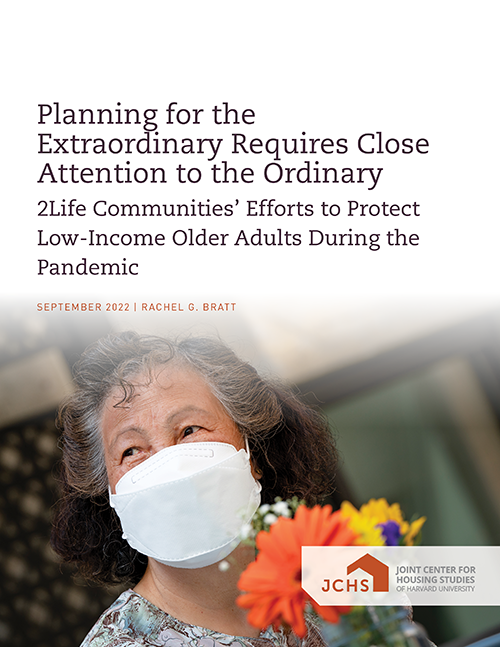Planning for the Extraordinary Requires Close Attention to the Ordinary: 2Life Communities’ Efforts to Protect Low-Income Older Adults During the Pandemic
Within the first few months of the pandemic, news reports began to describe the serious impacts of the coronavirus on older adults, especially those living in congregate settings. As the reality of the pandemic sank in, a nonprofit housing organization operating in the Boston area, 2Life Communities, was in overdrive implementing steps to safeguard the health and safety of its low-income residents and staff. In response to the fast-spreading coronavirus, 2Life made a series of quick responses and developed a program for providing extensive free services to its residents, in order to protect all who worked or lived in their buildings. 2Life’s approach also embodied a socially just approach to the pandemic: the organization prioritized the health and well-being of low-income older adults from diverse racial and ethnic backgrounds. These groups—low-income, Hispanic, and Black – turned out to be the most vulnerable in terms of contracting the virus, dying from the virus, and not receiving the vaccine as quickly as more affluent people and white people.
This exploration of 2Life Communities profiles an institutional effort, outside the health care system, to meet the COVID-19 challenge. As stories continued to unfold during the pandemic, we were regularly presented with analyses of the patient overload facing health care providers, the limitations of hospital capacity, the impacts of new treatments such as monoclonal antibodies, the threat of viral mutations such as the Delta and Omicron variants, the effectiveness of masks, and the reasons behind the resistance to the vaccine and mask mandates. In addition, there has been ongoing concern and analysis about the long-term effectiveness of vaccines, the frequency of infection among fully vaccinated people, the need for booster shots, and the troubling long-term effects of the virus. What we have not seen is an analysis of effective institutional responses to the pandemic from the perspective of a non-health care provider. This case study is an attempt to highlight the importance of this line of inquiry. It analyzes how one entrepreneurial owner of affordable housing for older adults went about safeguarding the health and well-being of its residents and staff as it confronted COVID-19.

